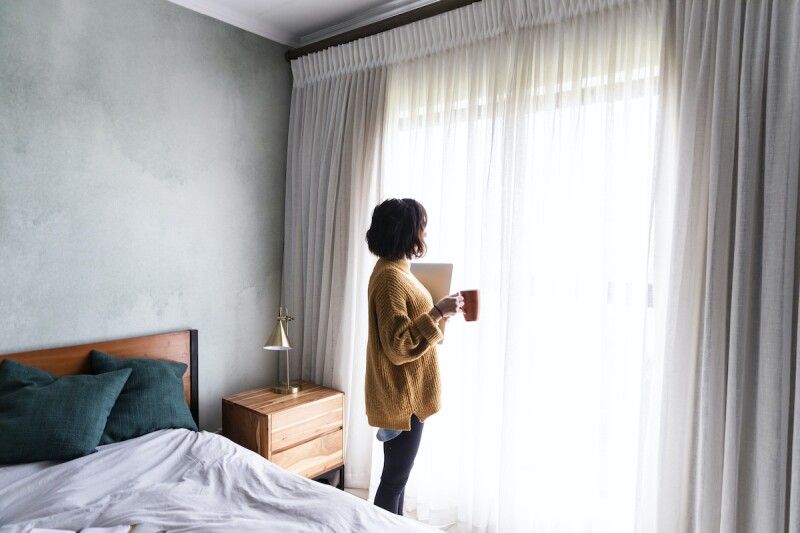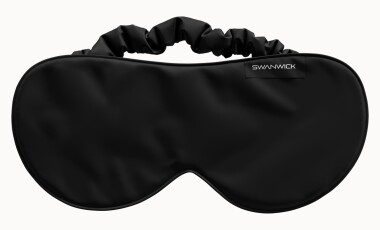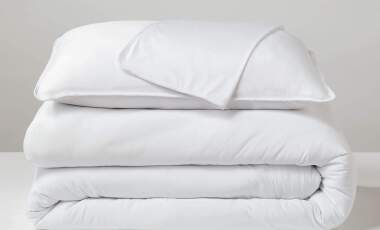For every season, a picturesque image often comes to mind: spring flowers, summer beaches, cozy fall fires, and bundled winters. We all have our favorite ways of enjoying all four seasons — and we all have our own particular annoyances about each one, too. Mainly dark nights and varying temperatures, all of which not only influence our mood but also our sleep patterns and habits.
It’s simple cause and effect: Morning light signals your body when to wake up while darkening skies and cooling temperatures signal your body it’s time to sleep. When these factors change, and you’re unprepared, it can really mess with your sleep. Even if you don’t live in an area that changes through all four seasons, you’re likely still experience daylight saving time, which brings its own sleepy frustrations.
Being aware of these seasonal fluctuations may also be what makes or breaks a vacation. Ever been to a city you thought was supposed to be sunny — only to be hit with frigid winds? We can avoid that kind of disruption, especially in your sleep.
To get ahead of sleep changes by the season (or make quick changes now) and maximize your Zzz’s for the weather, learn exactly how temperature, light, and time changes can shift the way you sleep.
Spring brings allergies and light disruption
Spring is a time of many changes (literally). As flowers bloom and April showers bring down the pollen from the trees, this environmental dust can also aggravate allergies at night. Pollen is shown to reduce sleep quality by making hay fever symptoms worse. All that coughing and sneezing at night can create tension during wind-down time, making you feel less relaxed.
On top of allergies, there is daylight saving time, which brings most states in the U.S. forward one hour. Though jumping ahead an hour gives people 60 minutes of extra sunlight in the evening, it can sometimes wreak havoc on our sleep cycles for those sensitive to light changes.
Our bodies get the signal to relax through melatonin, which is released when we experience a shift from light to dark. Additional light exposure later in the evening throws off our body’s natural circadian rhythm and delays melatonin production. This can shift our bodies’ schedule and understanding for when it’s time for rest.
How to plan ahead: Thankfully, daylight saving time is not a surprise event — even though it feels like one. Anticipating the effects and shifting your priorities to accommodate a new sleep schedule before the shift happens can make the transition more pleasant, and short-lived.
“A simple way to ensure that daylight saving time doesn't impact your sleep is by slowly adjusting your sleep time in the weeks leading up to the time change,” suggests sleep specialist and neuroscientist Dr. Chelsie Rohrscheib. One way to do so is to start going to bed a half-hour earlier for one to two weeks to help your body get ready for the upcoming time change.
To alleviate allergen issues, consider washing your bed sheets once a week using the hottest-recommended wash and dry settings for your fabrics. Keeping your bedroom clean by vacuuming or wiping away dust can also reduce allergens around you. Lastly, reduce time spent outside on days with high pollen counts, which you can find updates for on pollen.com.
Summer sun throws off our sleep schedule

Excess light exposure in the summer increases how much time we stay awake, particularly in northern states with late sunsets that can happen as late as 10 p.m. “Summer can make sleeping difficult due to longer daylight hours and increased heat,” Rohrscheib says.
Like light, temperature plays a role in how our body tells itself it’s time to sleep and coincides with melatonin release. Increase in temperature could make it harder for you to fall asleep — and then stay asleep. Researchers note that humid heat in particular can add to the thermal load on the body, and cause you to wake up more throughout the night. General environmental heat can also have the same effect by increasing heart rate, causing you to sleep poorly.
These disruptions can lead to decreased slow wave sleep, an important stage of sleep for processing emotions and memories.
How to plan ahead: If overexposure to light is your primary issues, try to control your environment with blackout curtains, opening them only when your alarm tells you to wake up. Blackout curtains work both with keeping out light pollution and keeping your bedroom cool.
And if you live in a city where summers mean sleeping through heat waves, staying cool is going to be the name of your game. In places where air conditioning isn’t an option, Rohrscheib suggests using a gel cooling pad on top of your mattress or an electric fan.
“Make sure your bedding is made of 100% breathable cotton and keep cold water on your bed stand,” she says. “In extreme heat, try taking a cold shower before bed or sleeping with an icepack on the back of your neck.”
Fall is like spring, but cozier
Fall once again sees a time change, with the end of daylight saving time, meaning that clocks move back an hour. While this may be easier for some, since you actually gain an hour of sleep, it can still disrupt our circadian rhythm by making us feel sleepy earlier in the evening due to earlier sunset times.
One way to counteract this is to slowly adjust your sleep schedule in the weeks leading up to the time change like you would in the spring, Rohrscheib says.
Yet shorter days (and those pesky earlier sunsets) may also work against us. Decreased light exposure can lead to daytime sleepiness and feeling sluggish.
“Avoid oversleeping, which can cause sleep inertia and lethargy the next day,” physiologist and sleep expert Dr. Nerina Ramlakhan suggests. A host of fall allergens like ragweed can also affect sleep, and cause oversleeping, but taking the same preventative steps as you would for spring allergens may help.
After getting past the hurdle of another time change, some people may actually see improved sleep in the fall. That’s because as temperatures dip and become pleasantly cool, the weather creates the ideal environment for quality sleep. Some researchers estimate that anywhere between 60 and 70 degrees Fahrenheit is the best bedroom temperature for sleep, so keeping your room on the cool side at night (whether from an open window or by leaving your heat on low) is a good idea.
How to plan ahead: When it comes to light exposure, it’s time to maximize it. Get outside when possible and start implementing an enjoyable morning routine that will get you excited to wake up.
“Make sure you are getting plenty of sun exposure during the day, especially in the morning,” Rohrscheib adds. “If you live in an area where the sky is overcast, consider getting a UV light lamp or special glasses made for jet lag to help keep your circadian rhythm regulated.
Winter can be a sleep struggle

Out of the four seasons, winter may present the most sleep challenges. Days in northern states are often less than 12 hours, which means people experience more darkness than sunshine, particularly after the winter solstice in January and February.
“Winter months are perhaps the most disrupting to our sleep and general well-being because the days are at their shortest,” Rohrscheib explains. “Not only does this negatively impact sleep, but it also carries a serious risk of causing seasonal depression.”
Seasonal depression occurs when our brains struggle to differentiate between night and day, especially if it gets dark outside as early as 4 p.m. The effects of light and changing seasons can also bring about seasonal affective disorder, or seasonal depression, like Rohrscheib says.
In this mood disorder, which impacts up to 6% of the population in the winter, many people experience hypersomnia, or sleeping too much. One study found that out of 293 patients with seasonal affective disorder, 80% reported hypersomnia while just 10% reported insomnia.
How to plan ahead: One way to help recreate a healthy sleep habits is through the use of bright light therapy. Special tools like light boxes or lamps mimic daylight and can be kept at one’s desk. A vitamin D supplement may also help, since vitamin D deficiencies are often linked with decreased sleep quality (and vitamin D levels can drop in the winter).
If dry winter weather affects your skin, making it painful or itchy enough for you to be up all night, there are simple steps you can take. “If you find that your nose is constantly dry, you have chapped lips, or you're waking up with a dry mouth, consider using a humidifier in your bedroom,” Rohrscheib says. “Using lip balm of petroleum jelly on your lips and sinus washes can also help to alleviate winter dryness.”
While temperature, light and time are often out of our control, sometimes being aware of how they can disrupt or facilitate our sleep can us create the perfect sleep environment. Room additions like blackout curtains or fans could be the small change you need for a good night’s rest.
To see what other kind of sleep enhancements might help you sleep well through the seasons, check out our product picks below. [Note: If you buy something using a link on our site, we may earn a commission.]












